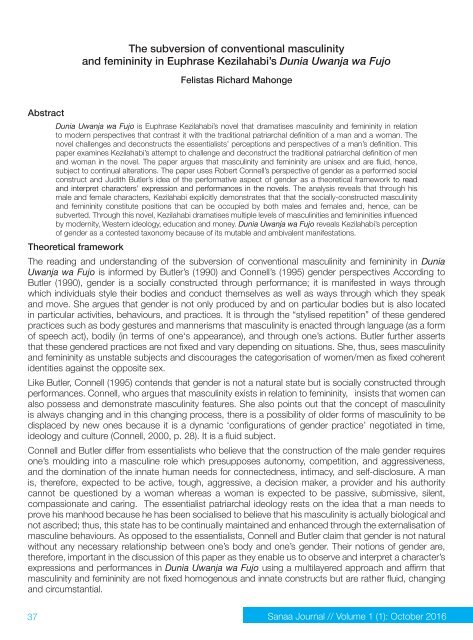African Arts Media Cultures
SanaaJournalIssue1Vol.1
SanaaJournalIssue1Vol.1
You also want an ePaper? Increase the reach of your titles
YUMPU automatically turns print PDFs into web optimized ePapers that Google loves.
The subversion of conventional masculinity<br />
and femininity in Euphrase Kezilahabi’s Dunia Uwanja wa Fujo<br />
Felistas Richard Mahonge<br />
Abstract<br />
Dunia Uwanja wa Fujo is Euphrase Kezilahabi’s novel that dramatises masculinity and femininity in relation<br />
to modern perspectives that contrast it with the traditional patriarchal definition of a man and a woman. The<br />
novel challenges and deconstructs the essentialists’ perceptions and perspectives of a man’s definition. This<br />
paper examines Kezilahabi’s attempt to challenge and deconstruct the traditional patriarchal definition of men<br />
and woman in the novel. The paper argues that masculinity and femininity are unisex and are fluid, hence,<br />
subject to continual alterations. The paper uses Robert Connell’s perspective of gender as a performed social<br />
construct and Judith Butler’s idea of the performative aspect of gender as a theoretical framework to read<br />
and interpret characters’ expression and performances in the novels. The analysis reveals that through his<br />
male and female characters, Kezilahabi explicitly demonstrates that that the socially-constructed masculinity<br />
and femininity constitute positions that can be occupied by both males and females and, hence, can be<br />
subverted. Through this novel, Kezilahabi dramatises multiple levels of masculinities and femininities influenced<br />
by modernity, Western ideology, education and money. Dunia Uwanja wa Fujo reveals Kezilahabi’s perception<br />
of gender as a contested taxonomy because of its mutable and ambivalent manifestations.<br />
Theoretical framework<br />
The reading and understanding of the subversion of conventional masculinity and femininity in Dunia<br />
Uwanja wa Fujo is informed by Butler’s (1990) and Connell’s (1995) gender perspectives According to<br />
Butler (1990), gender is a socially constructed through performance; it is manifested in ways through<br />
which individuals style their bodies and conduct themselves as well as ways through which they speak<br />
and move. She argues that gender is not only produced by and on particular bodies but is also located<br />
in particular activities, behaviours, and practices. It is through the “stylised repetition” of these gendered<br />
practices such as body gestures and mannerisms that masculinity is enacted through language (as a form<br />
of speech act), bodily (in terms of one‘s appearance), and through one’s actions. Butler further asserts<br />
that these gendered practices are not fixed and vary depending on situations. She, thus, sees masculinity<br />
and femininity as unstable subjects and discourages the categorisation of women/men as fixed coherent<br />
identities against the opposite sex.<br />
Like Butler, Connell (1995) contends that gender is not a natural state but is socially constructed through<br />
performances. Connell, who argues that masculinity exists in relation to femininity, insists that women can<br />
also possess and demonstrate masculinity features. She also points out that the concept of masculinity<br />
is always changing and in this changing process, there is a possibility of older forms of masculinity to be<br />
displaced by new ones because it is a dynamic ‘configurations of gender practice’ negotiated in time,<br />
ideology and culture (Connell, 2000, p. 28). It is a fluid subject.<br />
Connell and Butler differ from essentialists who believe that the construction of the male gender requires<br />
one’s moulding into a masculine role which presupposes autonomy, competition, and aggressiveness,<br />
and the domination of the innate human needs for connectedness, intimacy, and self-disclosure. A man<br />
is, therefore, expected to be active, tough, aggressive, a decision maker, a provider and his authority<br />
cannot be questioned by a woman whereas a woman is expected to be passive, submissive, silent,<br />
compassionate and caring. The essentialist patriarchal ideology rests on the idea that a man needs to<br />
prove his manhood because he has been socialised to believe that his masculinity is actually biological and<br />
not ascribed; thus, this state has to be continually maintained and enhanced through the externalisation of<br />
masculine behaviours. As opposed to the essentialists, Connell and Butler claim that gender is not natural<br />
without any necessary relationship between one’s body and one’s gender. Their notions of gender are,<br />
therefore, important in the discussion of this paper as they enable us to observe and interpret a character’s<br />
expressions and performances in Dunia Uwanja wa Fujo using a multilayered approach and affirm that<br />
masculinity and femininity are not fixed homogenous and innate constructs but are rather fluid, changing<br />
and circumstantial.<br />
37 Sanaa Journal // Volume 1 (1): October 2016


